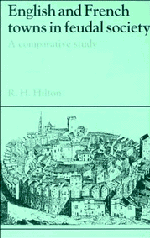4 - Urban rulers
Published online by Cambridge University Press: 03 May 2011
Summary
The social composition of the urban ruling classes in England and France and their relationship with the feudal landowning interest is a fundamental issue. The answer, or rather answers, to this problem are by no means simple but of great importance, if we are to consider, not only the origins, but also the later history of the urban patriciate.
Our consideration of the place of urban craft production within feudalism has tended to stress the mercantile interest in controlling it. In so far as the manufacturing crafts were producing for so wide a market that they did not have contact with the ultimate consumer, the role of the merchant middleman would be crucial economically and would (ideally, from the point of view of the merchant) best be enforceable in political terms by a mercantile ruling group. Ruling elites which were primarily mercantile emerged in some towns, especially with the development of international trade in luxury or long-distance commodities from the twelfth century. But in fact, the social composition of urban ruling elites, or ‘patricians’ was never homogeneous and often changed over time.
As we have seen, in the early middle ages, the towns which best survived the post-Roman chaos tended to be administrative centres rather than focal points for what was left of long-distance trade, though they had an urban function as local market centres. The first survivals were episcopal cities, soon becoming centres also of lay powers representing (theoretically, at any rate) the royal or imperial rulers.
- Type
- Chapter
- Information
- English and French Towns in Feudal SocietyA Comparative Study, pp. 87 - 104Publisher: Cambridge University PressPrint publication year: 1992

